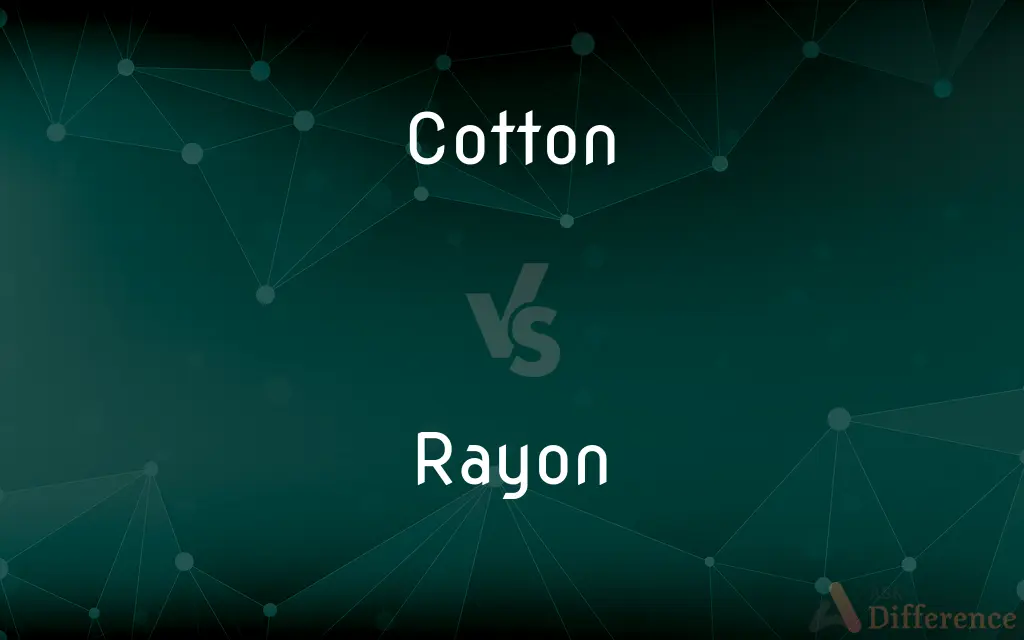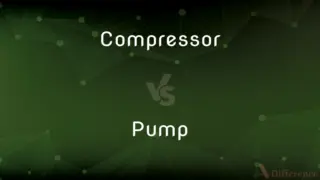Cotton vs. Rayon — What's the Difference?
Edited by Tayyaba Rehman — By Fiza Rafique — Updated on September 22, 2023
Cotton is a natural fiber obtained from the cotton plant, widely used in textiles. Rayon, also used in textiles, is a synthetic fiber made from cellulose, typically derived from wood pulp.

Difference Between Cotton and Rayon
Table of Contents
ADVERTISEMENT
Key Differences
Cotton is a natural fiber that comes directly from the cotton plant. It is highly breathable, absorbent, and soft. Rayon, on the other hand, is a synthetic or semi-synthetic fiber, although it originates from natural cellulose usually sourced from wood pulp.
Cotton fibers possess a high level of durability and are often used in everyday clothing and household items. Rayon fibers, though versatile, are generally less durable and may not hold up as well to repeated washing and wearing.
In terms of environmental impact, cotton agriculture requires significant amounts of water and may involve pesticides. Rayon production is chemical-intensive, involving steps that convert wood pulp into fiber, and can be environmentally taxing as well.
Cotton fabrics tend to shrink and wrinkle more easily compared to rayon. Rayon is more likely to stretch and does not insulate body heat, making it ideal for hot climates, unlike cotton which is more versatile in varying temperatures.
While cotton is generally more hypoallergenic, catering to sensitive skin, rayon can sometimes cause irritation. This is because the chemical process that creates rayon can leave behind trace elements that some individuals may be sensitive to.
ADVERTISEMENT
Comparison Chart
Origin
Natural
Synthetic
Durability
High
Moderate to Low
Environmental Impact
Water & Pesticides
Chemical-Intensive
Behavior
Shrinks, Wrinkles
Stretches
Skin Sensitivity
Hypoallergenic
May Cause Irritation
Compare with Definitions
Cotton
Natural textile fiber.
Cotton shirts are soft and breathable.
Rayon
Chemical-intensive production.
Rayon manufacturing can be harmful to the environment.
Cotton
Obtained from the cotton plant.
Cotton is harvested from cotton fields.
Rayon
Stretchy material.
Rayon fabrics are more stretchy than cotton.
Cotton
Hypoallergenic.
Cotton is a good choice for sensitive skin.
Rayon
Semi-synthetic fiber.
Rayon clothes are also breathable.
Cotton
Cotton is a soft, fluffy staple fiber that grows in a boll, or protective case, around the seeds of the cotton plants of the genus Gossypium in the mallow family Malvaceae. The fiber is almost pure cellulose.
Rayon
Sensitive to water.
Rayon fabrics may distort when wet.
Cotton
Any of various shrubby plants of the genus Gossypium, having showy flowers and grown for the soft white downy fibers surrounding oil-rich seeds.
Rayon
Derived from cellulose.
Rayon is made from wood pulp.
Cotton
The fiber of any of these plants, used in making textiles and other products.
Rayon
Rayon is a synthetic fiber, made from natural sources of regenerated cellulose, such as wood and related agricultural products. It has the same molecular structure as cellulose.
Cotton
Thread or cloth manufactured from the fiber of these plants.
Rayon
Any of several synthetic textile fibers produced by forcing a cellulose solution through fine spinnerets and solidifying the resulting filaments.
Cotton
Any of various soft downy substances produced by other plants, as on the seeds of a cottonwood.
Rayon
A fabric so woven or knit.
Cotton
To take a liking; attempt to be friendly
A dog that didn't cotton to strangers.
An administration that will cotton up to the most repressive of regimes.
Rayon
A manufactured regenerated cellulosic fiber.
Cotton
To come to understand. Often used with to or onto
"The German bosses ... never cottoned to such changes" (N.R. Kleinfield).
Rayon
Ray; beam.
Cotton
Gossypium, a genus of plant used as a source of cotton fiber.
Rayon
A synthetic fiber, made of thin filaments of regenerated cellulose, extruded from a solution of viscose. Called also viscose fiber and viscose rayon fiber.
Cotton
Any plant that encases its seed in a thin fiber that is harvested and used as a fabric or cloth.
Rayon
A textile fabric made from rayon{1}.
Cotton
Any fiber similar in appearance and use to Gossypium fiber.
Rayon
A synthetic silklike fabric
Cotton
(textiles) The textile made from the fiber harvested from a cotton plant, especially Gossypium.
Cotton
(countable) An item of clothing made from cotton.
Cotton
Made of cotton.
Cotton
(transitive) To provide with cotton.
Cotton
To supply with a cotton wick.
Cotton
To fill with a wad of cotton.
Cotton
(horticulture) To wrap with a protective layer of cotton fabric.
Cotton
To cover walls with fabric.
Cotton
(tar and cotton) To cover with cotton bolls over a layer of tar (analogous to tar and feather )
Cotton
To make or become cotton-like
Cotton
To raise a nap, providing with a soft, cottony texture.
Cotton
To develop a porous, cottony texture.
Cotton
To give the appearance of being dotted with cotton balls.
Cotton
To enshroud with a layer of whiteness.
Cotton
To protect from harsh stimuli, coddle, or muffle.
Cotton
To rub or burnish with cotton.
Cotton
To get on with someone or something; to have a good relationship with someone.
Cotton
A soft, downy substance, resembling fine wool, consisting of the unicellular twisted hairs which grow on the seeds of the cotton plant. Long-staple cotton has a fiber sometimes almost two inches long; short-staple, from two thirds of an inch to an inch and a half.
Cotton
The cotton plant. See Cotten plant, below.
Cotton
Cloth made of cotton.
Cotton
To rise with a regular nap, as cloth does.
It cottons well; it can not choose but bearA pretty nap.
Cotton
To go on prosperously; to succeed.
New, Hephestion, does not this matter cotton as I would?
Cotton
To unite; to agree; to make friends; - usually followed by with.
A quarrel will end in one of you being turned off, in which case it will not be easy to cotton with another.
Didst see, Frank, how the old goldsmith cottoned in with his beggarly companion?
Cotton
To take a liking to; to stick to one as cotton; - used with to.
Cotton
Silky fibers from cotton plants in their raw state
Cotton
Fabric woven from cotton fibers
Cotton
Erect bushy mallow plant or small tree bearing bolls containing seeds with many long hairy fibers
Cotton
Thread made of cotton fibers
Cotton
Take a liking to;
Cotton to something
Cotton
Highly absorbent material.
Cotton towels soak up water efficiently.
Cotton
Prone to shrinking.
Cotton clothes may shrink in the dryer.
Common Curiosities
How are cotton and rayon different?
Cotton is natural and durable, while rayon is synthetic and less durable.
What is cotton?
A natural fiber obtained from the cotton plant.
Is cotton hypoallergenic?
Generally, yes, making it suitable for sensitive skin.
Can rayon cause skin irritation?
It can, due to the chemicals used in its production.
Where is rayon commonly used?
In clothing, especially those designed for hot climates.
What is rayon?
A synthetic or semi-synthetic fiber derived from cellulose.
Does rayon stretch?
Yes, rayon is more likely to stretch and distort when wet.
How durable is cotton?
Cotton is generally quite durable and long-lasting.
Is cotton environmentally friendly?
Cotton farming can require lots of water and pesticides.
Is rayon environmentally friendly?
Rayon production is chemical-intensive and can be harmful to the environment.
Where is cotton commonly used?
In everyday clothing and household items like towels.
Does cotton shrink?
Yes, cotton tends to shrink and wrinkle.
How is rayon made?
From wood pulp or other cellulose sources, chemically processed into fiber.
How is cotton made?
Harvested from cotton plants and then spun into fiber.
How durable is rayon?
Less durable than cotton, especially when wet.
Share Your Discovery

Previous Comparison
Compressor vs. Pump
Next Comparison
Commit vs. PushAuthor Spotlight
Written by
Fiza RafiqueFiza Rafique is a skilled content writer at AskDifference.com, where she meticulously refines and enhances written pieces. Drawing from her vast editorial expertise, Fiza ensures clarity, accuracy, and precision in every article. Passionate about language, she continually seeks to elevate the quality of content for readers worldwide.
Edited by
Tayyaba RehmanTayyaba Rehman is a distinguished writer, currently serving as a primary contributor to askdifference.com. As a researcher in semantics and etymology, Tayyaba's passion for the complexity of languages and their distinctions has found a perfect home on the platform. Tayyaba delves into the intricacies of language, distinguishing between commonly confused words and phrases, thereby providing clarity for readers worldwide.















































